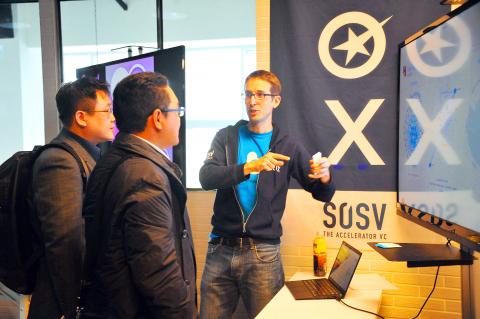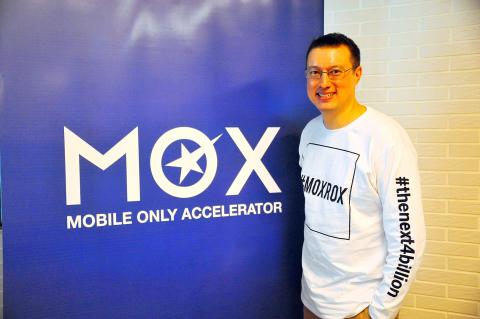About halfway through his two-month stay in Taipei, Internet entrepreneur Stefano Roncari decided to start up his new venture here after being based in Beijing for the past decade.
In addition to the city’s livability, Roncari found that there wasn’t just an abundance of quality engineers and machine learning specialists in Taiwan, but unlike Beijing, where most people want to be part of a huge company, he says a high percentage of them are passionate about startups.
“It’s a smaller market, and people [in Taiwan] are used to solving their own problems and making an impact,” he says. “They want to be working in a small team.”

Photo: Han Cheung, Taipei Times
Roncari arrived in Taipei in January as one of eight startups selected by MOX, a Silicon Valley-style mobile-only accelerator, for its first batch of businesses after launching in December. This batch, which includes companies based in India, Israel, South Korea and the US, just concluded demo days in Taipei and Singapore last week where they presented their ideas to potential partners and investors.
The Taipei-based MOX provides capital, industry and business mentors, networking and client resources and other services in exchange for equity and revenue share for companies who want to move into areas like Southeast Asia, Eastern Europe and South America where people primarily access the Internet through their mobile phones.
The eight companies vary in services and stage of development, ranging from MyBrana, an augmented reality video creator to Tappy Toon, a “Netflix” for comics, to Roncari’s Bubbleye, which uses machine learning and artificial intelligence algorithms to maximize the performance of mobile ads.

Photo: Han Cheung, Taipei Times
ACCELERATION
MOX comes from a lot of money — it is one of six global accelerators run by SOSV, a US-based US$250 million (NT$8 billion) venture fund. Each accelerator is sector-based. The companies they choose must spend at least two months in MOX’s Taipei office, working closely with Bean and other staff who “accelerate” their progress by linking them to a variety of crucial resources or helping them localize their product.
“We look at the team and traction,” MOX Managing Director William Bao Bean (賓威廉) says. “We look at users and whether they come back. We don’t care about how much money they have because they’re not paying.”
With local advertising and internet services platform General Mobile Corporation (GMobi, 通用移動) as a partner, MOX’s companies receive free advertising to Gmobi’s 100 million users in Southeast Asia.
“When you start out, the most amount of money is acquiring the customer,” Gift on the Go CEO Alok Singh says.
“With us, all you have to do is make your app awesome,” Bean says. “We’re trying to flip the model [of having to pay for advertising first].”
Bean says a big part of the work is helping these companies localize to their new target market.
“Southeast Asia is mobile first and mobile only,” he says. “You have to change your product, your user experience, how you make money.”
For example, one company had to downsize its app from 40mb to 10mb to accommodate local internet resources.
WHY TAIWAN?
Bean hopes to involve some Taiwanese companies in future batches as the company recruits its second batch later this year.
“The future of Taiwan tech is Internet,” Bean, who started his technology investment career in Taiwan, says, adding that he can help new local companies move into emerging markets.
As a mentor at Taiwan Startup Stadium, Bean had already been working with some of these locals. But when MOX made offers to several Taiwanese companies for the first batch, Bean says he found that investors were wary of this new model that required sharing equity, which isn’t popular here but is the norm in Silicon Valley.
As a global company, MOX could theoretically be based anywhere, and Bean’s answer is simple.
“It’s nice here,” he says, referring to the convenience, good food, reasonable weather and so on.
He adds that it is also a good balance of infrastructure and rent costs — falling somewhere between Hong Kong and Bangkok. Plus, Bean says you can recruit talented staff who mostly speak English for a lower cost.
Bean also hopes to foster somewhat of a local mobile startup community. For example, every week when the companies are in Taiwan and every month otherwise, MOX flies in international experts for a happy hour event that is open to the public, with free drinks and a barbecue afterward — which Bean calls a “Silicon Valley style get-together.”
Finally, he hopes to attract more people like Roncori who also find that Taiwan is a great place for an Internet startup.
“They’re moving here, they’re creating jobs,” he says. “You’re bringing international expertise from around the world and actually living here as opposed to visiting a few times. It helps create that community.”

That US assistance was a model for Taiwan’s spectacular development success was early recognized by policymakers and analysts. In a report to the US Congress for the fiscal year 1962, former President John F. Kennedy noted Taiwan’s “rapid economic growth,” was “producing a substantial net gain in living.” Kennedy had a stake in Taiwan’s achievements and the US’ official development assistance (ODA) in general: In September 1961, his entreaty to make the 1960s a “decade of development,” and an accompanying proposal for dedicated legislation to this end, had been formalized by congressional passage of the Foreign Assistance Act. Two

March 31 to April 6 On May 13, 1950, National Taiwan University Hospital otolaryngologist Su You-peng (蘇友鵬) was summoned to the director’s office. He thought someone had complained about him practicing the violin at night, but when he entered the room, he knew something was terribly wrong. He saw several burly men who appeared to be government secret agents, and three other resident doctors: internist Hsu Chiang (許強), dermatologist Hu Pao-chen (胡寶珍) and ophthalmologist Hu Hsin-lin (胡鑫麟). They were handcuffed, herded onto two jeeps and taken to the Secrecy Bureau (保密局) for questioning. Su was still in his doctor’s robes at

Last week the Democratic Progressive Party (DPP) said that the budget cuts voted for by the China-aligned parties in the legislature, are intended to force the DPP to hike electricity rates. The public would then blame it for the rate hike. It’s fairly clear that the first part of that is correct. Slashing the budget of state-run Taiwan Power Co (Taipower, 台電) is a move intended to cause discontent with the DPP when electricity rates go up. Taipower’s debt, NT$422.9 billion (US$12.78 billion), is one of the numerous permanent crises created by the nation’s construction-industrial state and the developmentalist mentality it

Experts say that the devastating earthquake in Myanmar on Friday was likely the strongest to hit the country in decades, with disaster modeling suggesting thousands could be dead. Automatic assessments from the US Geological Survey (USGS) said the shallow 7.7-magnitude quake northwest of the central Myanmar city of Sagaing triggered a red alert for shaking-related fatalities and economic losses. “High casualties and extensive damage are probable and the disaster is likely widespread,” it said, locating the epicentre near the central Myanmar city of Mandalay, home to more than a million people. Myanmar’s ruling junta said on Saturday morning that the number killed had